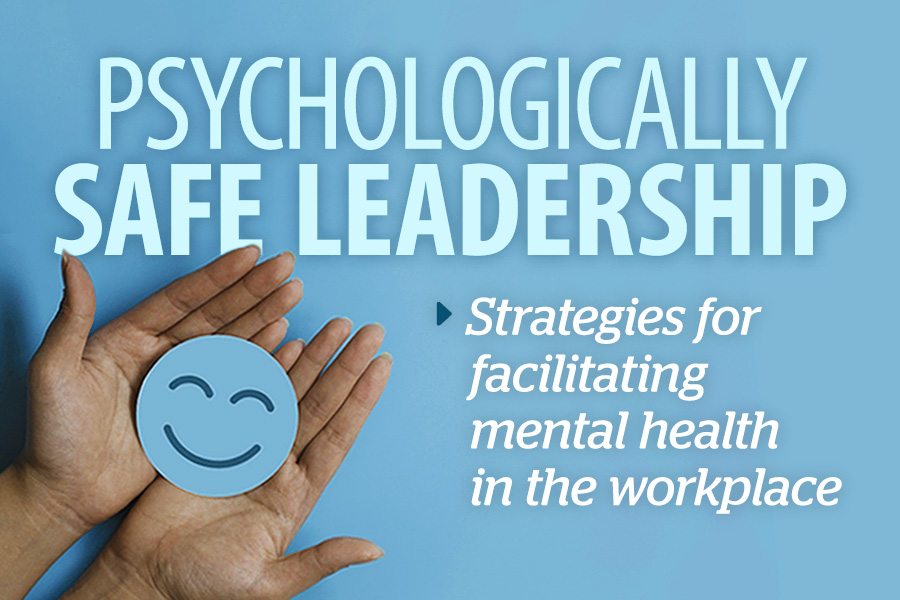
How today’s workplace leaders can become more inclusive
By Bill Howatt and Troy Winters
Inclusion helps create conditions for diversity — the makeup of your team that encourages members to thrive in all aspects, from job performance to physical and psychological health

EDITOR’S NOTE: ‘Psychologically Safe Leadership: Strategies for facilitating mental health in the workplace’ is a web series in partnership with Dr. Bill Howatt of Howatt HR Consulting in Ottawa, and Troy Winters, senior health and safety officer at the Canadian Union of Public Employees (CUPE) in Ottawa.
Successful leaders are inclusive leaders who ensure their teams experience a welcoming, caring, and open workplace.
Their approach and style reduce perceived fear and concern, leading to an inclusive culture where fear is removed and all employees believe their voice can be heard and listened to.
Inclusion helps create conditions for diversity — the makeup of your team that encourages members to thrive in all aspects, from job performance to physical and psychological health.
Organizations are encouraged to develop a diverse culture. A diverse workforce through all levels of an organization increases innovation and creativity by bringing together various perspectives.
Some organizations have striven to reach a diverse workforce but failed at being an inclusive workplace. To leverage the power of a diverse team, you must ensure that your workplace is inclusive. The day-to-day interactions of the employee-manager relationship play a vital role in shaping an inclusive culture.
In its 2018 report, Deloitte found that organizations with inclusive cultures were twice as likely to exceed financial targets, six times more likely to be innovative and agile, and eight times more likely to achieve better business outcomes.
Most importantly, the report stated that the “behaviours of leaders . . . can drive up to 70 percentage points of difference between the proportion of employees who feel highly included and the proportion of those who do not.”
The microskills of inclusiveness
“One factor that will have a positive impact for promoting inclusion in the workplace are leaders who are committed to being psychological safe leaders.” — Dr. Bill Howatt
We suggest that all leaders who desire to be inclusive apply the following microskills.
An excellent place to start is acknowledging employees’ work and letting them know you appreciate their efforts and challenges. Take time to recognize what they’re doing well, not highlighting only where things can be better. Avoid using broad strokes. Be authentic and express your points of view in a meaningful way that demonstrates you value their contribution. This helps promote a sense of belonging and connection.
Empowering attitude
Be aware of your leadership style, experience, and limitations. It is not good enough to only be open to hearing team members’ points of view.
Create a safe space where there is an expectation that everyone’s point of view will be heard without judgement or interruption. Allow team members to collaborate and have the required time and resources to complete their assigned tasks.
Psychologically Safe Workplace Awards provide employers tools, data on mental health
Engagement
Create conditions for inclusion by being curious (but not inappropriately invasive) about team members’ interests and values. Learning more about your team’s experiences and perceptions helps you understand each member’s point of view.
Work with team members to understand their preferences. Ask how they like to stay connected and share, and encourage them to ask questions when they feel unsure or concerned.
“The lack of inclusive practices in the workplace is a significant psychosocial hazard, undermining any of the potential health and safety benefits gained through team diversity.” – Troy Winters, CRSP
Cultural awareness
Learn about practices, beliefs, and expectations of other cultures and religions so you know how to be supportive and adaptive as needed. You do not have to be an expert in all backgrounds. Be open and understand that failure to respect cultural and religious beliefs can negatively impact the employee experience.
Lionel Laroche has found through research that when asked about leader-employee relationships, people raised in the average Canadian educational system tend to want their leaders to give them the freedom to determine the best way to perform work. However, some workers new to the country often expect clear, extensive directions. Leaders can be most supportive by being open to potential differences in what their team members need for detail to perform their assigned duties.
One helpful practice is discovering from employees on your team potentially important cultural or religious days and keeping track of them on a calendar to help you be aware, recognize, and accommodate when needed.
Avoid implicit bias
Though workers are all different, we must avoid falling into the trap of assuming that workers from a particular background, religion, ethnicity, or even generation all fall into the same category.
Have open conversations with your team members to understand their needs and ask questions to get to know them better. This can help create a safe and welcoming experience for all employees.
Be aware of privilege
The expression, we are all in the same storm, but we have different boats, is an appropriate metaphor to think about the privilege that impacts a person’s journey to where they find themselves in your organization. Due to external factors (many built into society) that are out of workers’ control, some will have had to work harder to get to their status.
Workers in the majority population don’t face the discrimination, negative assumptions, and behaviours that minority or marginalized populations endure.
Being open and aware of how privilege may be a factor is helpful for a leader to act inclusively. Watch the YouTube short Privilege to get some context on this point.
 Dr. Bill Howatt is the Ottawa-based president of Howatt HR Consulting in Ottawa.
Dr. Bill Howatt is the Ottawa-based president of Howatt HR Consulting in Ottawa.

Troy Winters is a senior health and safety officer at the Canadian Union of Public Employees (CUPE) in Ottawa.